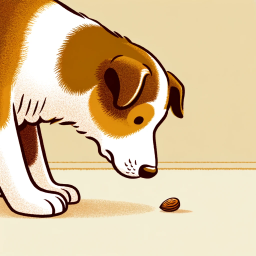Can Dogs Eat Almonds?Understanding the Risks

Can dogs eat almonds? To know it read the full article. Although almonds are not toxic to dogs, it is generally advised to avoid feeding them to your furry friend. Almonds can be difficult for dogs to digest and it may remain a choking hazard.
As a dog owner, it’s natural to want to share your snacks with your furry friend. Almonds, a popular and healthy snack for humans, often come into question.
This article explores whether it’s safe for dogs to eat almonds, addressing common concerns and misconceptions.
Can dogs eat almonds?
Nutritional Profile of Almonds, Benefits and Dangers for Dogs
Almonds are a nutritious snack for humans, but when it comes to our canine companions, they may not be the best choice. Understanding the potential harm almonds can cause to dogs is crucial for every pet owner.
Here’s a table that summarizes the nutritional profile of almonds, along with their potential benefits and dangers specifically for dogs:
| Nutritional Component | Content in Almonds | Potential Benefits for Dogs | Potential Dangers for Dogs |
|---|---|---|---|
| Protein | High | – Supports muscle development and repair | – Can be difficult to digest |
| Fiber | High | – Can aid in digestion | – May cause gastrointestinal upset |
| Vitamin E | High | – Antioxidant, may support skin health | – Risk of overconsumption; not a necessary supplement |
| Magnesium | High | – Supports bone health (in appropriate amounts) | – Excess may lead to digestive discomfort |
| Calcium | Moderate | – Beneficial for bone strength | – Excessive amounts can cause imbalances |
| Potassium | Moderate | – Good for heart health (in small amounts) | – Unnecessary in high amounts; possible heart and kidney issues |
| Healthy Fats | High | – Can contribute to a healthy coat | – High risk of pancreatitis and obesity |
| Calories | High | – Can provide energy (in small amounts) | – Risk of obesity and related health issues |
Key Points:
- Potential Benefits for Dogs: While almonds do contain nutrients that can be beneficial for dogs, the quantities present in almonds are not necessarily aligned with canine dietary needs. Some nutrients, like protein and vitamin E, can support muscle health and skin, but only when consumed in appropriate, controlled amounts.
- Potential Dangers for Dogs: The high fat content is a major concern, significantly increasing the risk of pancreatitis and obesity. Additionally, almonds can be hard to digest for dogs, leading to gastrointestinal issues. They also pose a choking hazard, especially for smaller dogs.
Recognizing Symptoms of Almond Poisoning in Dogs
While almonds are not toxic to dogs in the same way as some other nuts, like macadamia nuts, they can still cause significant health issues.
It’s essential for dog owners to recognize the symptoms of almond poisoning, a term that broadly covers the adverse effects of consuming almonds.
This article discusses these symptoms and provides guidance on what to do if you suspect your dog has eaten almonds.
Understanding the Risk
Almonds themselves are not inherently poisonous to dogs, but they can cause various health problems.
The risks include gastrointestinal upset, obstruction risks due to their size and hardness, and potential complications from high fat content, like pancreatitis.
Common Symptoms of Almond Poisoning in Dogs
- Gastrointestinal Distress: This can include symptoms such as vomiting, diarrhea, loss of appetite, and abdominal pain. These are often the first signs that a dog has eaten something they shouldn’t have.
- Choking or Obstruction: Signs of choking include difficulty breathing, coughing, and an inability to swallow. Obstruction in the digestive tract may cause ongoing vomiting, weakness, and a distended abdomen.
- Pancreatitis: Symptoms of pancreatitis include severe abdominal pain, vomiting, diarrhea, lethargy, and fever. This condition can be life-threatening and requires immediate veterinary attention.
- Water Retention and Salt Toxicity: If the almonds were salted, symptoms might include excessive thirst and urination, potential swelling from water retention, and in severe cases, signs of sodium ion poisoning like tremors, seizures, or coma.
What to Do If Your Dog Eats Almonds
- Don’t Panic, But Act Quickly: If you know or suspect your dog has eaten almonds, it’s important to act quickly but calmly.
- Contact Your Veterinarian: Describe the situation, including how many almonds were consumed and any symptoms your dog is showing.
- Follow Veterinary Advice: Your veterinarian might advise you to bring your dog in for an examination, or they may provide instructions for monitoring at home.
- Prevent Further Access: Ensure that almonds and other potentially harmful foods are kept out of your dog’s reach in the future.
Prevention is Key
The best way to protect your dog from the adverse effects of almonds is to prevent access to them.
Keep almonds and other nuts securely stored away from where your dog can reach them.
Safe Snack Alternatives to Almonds for Dogs
For dog owners looking to treat their furry friends, finding safe and healthy snack alternatives is essential.
While almonds can be risky for dogs, there are plenty of other options that can provide nutritional benefits without the associated dangers.
Healthy and Safe Snack Options for Dogs
- Carrots: A great source of vitamin A and fiber, carrots are low in calories and can be a crunchy, satisfying treat for dogs.
- Apples (Without Seeds): Apples are a good source of vitamins A and C, as well as fiber. Just make sure to remove the seeds and core before giving them to your dog.
- Green Beans: Plain green beans are a low-calorie snack that’s also rich in iron and vitamins.
- Pumpkin: Plain, cooked pumpkin is high in fiber and vitamin A and can be particularly beneficial for dogs with digestive issues.
- Blueberries: These are a superfood for both humans and dogs, packed with antioxidants and vitamins.
- Cucumber: Low in calories and high in water content, cucumbers can be a refreshing treat, especially on hot days.
- Plain, Cooked Chicken: A great source of protein, chicken can be an excellent treat, as long as it is cooked and unseasoned.
- Rice Cakes: Plain rice cakes can be a good low-calorie treat, but always ensure they are unsalted and unflavored.
- Special Dog Treats: There are many commercially available dog treats specifically formulated to be safe and healthy for dogs.
- Peanut Butter (Xylitol-Free): Dogs generally love peanut butter, but ensure it’s free from xylitol and other additives.
Things to Remember
- Moderation is Key: Even with safe snacks, it’s important to feed them in moderation as part of a balanced diet.
- Watch for Allergies: Just like humans, dogs can have food allergies. Introduce new snacks gradually and watch for any adverse reactions.
- Consult Your Vet: If you’re unsure about a certain food, it’s always best to consult with your veterinarian.
Preparing Healthy, Dog-Friendly Treats Without Almonds
As dog owners seek healthier treat options for their furry friends, the emphasis is often on what to avoid, with almonds being a notable example.
However, creating nutritious, dog-friendly treats without almonds can be both fun and beneficial for your pet.
Understanding Dog-Specific Nutrition
Before preparing any homemade dog treats, it’s essential to understand canine dietary needs.
Dogs require a balanced diet, which includes a good source of protein, some carbohydrates, and a minimal amount of fats.
Avoiding foods that are harmful to dogs, such as onions, chocolate, and grapes, is crucial.
Homemade Dog Treat Recipes
1. Pumpkin and Peanut Butter Biscuits
- Ingredients: Oat flour, pumpkin puree (not pie filling), and xylitol-free peanut butter.
- Preparation: Mix the ingredients, roll out the dough, cut into shapes, and bake until crispy.
2. Sweet Potato Chews
- Ingredients: Thinly sliced sweet potato.
- Preparation: Bake the slices at a low temperature until they are dry and chewy.
3. Chicken Jerky
- Ingredients: Boneless, skinless chicken breast.
- Preparation: Slice the chicken thinly, bake at a low temperature until the pieces are dry and hard.
4. Apple and Carrot Cubes
- Ingredients: Unsweetened applesauce, grated carrot, and whole wheat flour.
- Preparation: Mix ingredients, form into small cubes, and bake until firm.
5. Frozen Berry Yogurt Bites
- Ingredients: Plain, unsweetened yogurt and blueberries.
- Preparation: Mix yogurt with blueberries, freeze in an ice cube tray.
Tips for Preparing Dog Treats
- Choose Safe Ingredients: Always opt for dog-safe ingredients and avoid foods that are toxic to dogs.
- Mind the Portion Sizes: Treats should only be a small part of your dog’s diet.
- Consider Your Dog’s Preferences and Allergies: Pay attention to how your dog reacts to certain ingredients, especially if they have food sensitivities.
- Storage: Store homemade treats in an airtight container and refrigerate or freeze them to prolong their shelf life.
Read More: Micro Bully: Introduction and Essential CARING TIPS for Owners
Training Your Dog to Avoid Eating Almonds and Other Harmful Foods
Dogs are naturally curious creatures, often inclined to taste anything they come across.
This can be a concern, particularly with foods like almonds and other items that are harmful to them.
Training your dog to avoid eating such foods is an essential part of ensuring their safety and well-being.
This article outlines effective strategies for training your dog to steer clear of almonds and similar dangers.
Training Techniques
1. Leave It Command
- Description: Teaching your dog the “leave it” command is fundamental. This command tells your dog to immediately stop and move away from whatever they are interested in.
- How to Train: Start with a less tempting item, like a toy. Put it on the ground and say “leave it” when your dog approaches. Reward them with a treat and praise when they obey. Gradually progress to more tempting items, like food.
2. Trade-Up Game
- Description: This involves trading your dog’s current item for something better when they pick up something they shouldn’t.
- How to Train: When your dog picks up something like an almond, offer them a more enticing treat or toy in exchange. This teaches them that dropping the forbidden item results in a better reward.
3. Positive Reinforcement
- Description: Using positive reinforcement involves rewarding your dog for making the right choices.
- How to Train: Whenever your dog ignores food on the ground or leaves food when commanded, reward them with praise, affection, or treats.
4. Supervised Exposure
- Description: Supervised exposure to harmful foods in a controlled environment can reinforce training.
- How to Train: Place the food item on the ground while on a leash and practice the “leave it” command. If they obey, reward them. If they don’t, correct them gently.
Creating a Safe Environment
- Food Storage: Keep all harmful foods, including almonds, securely stored away from your dog’s reach.
- Educate Household Members: Ensure everyone in your household understands the risks and knows how to store food safely.
- Regular Training: Regularly practice these training exercises to keep the lessons fresh in your dog’s mind.
First Aid for Dogs: Dealing with Almond Ingestion
As a dog owner, knowing how to handle emergencies, such as your dog ingesting harmful foods like almonds, is crucial.
While almonds are not as toxic to dogs as some other foods, they can still cause health issues.
Here is a guide to first aid for dogs who have ingested almonds, helping you to respond effectively in such situations.
Immediate Steps to Take
- Assess the Situation: Determine how many almonds your dog has eaten and how they’re reacting. If it’s a small amount and your dog isn’t showing any immediate signs of distress, you may be able to monitor them at home.
- Remove Access: Ensure no more almonds are within reach of your dog to prevent further ingestion.
- Observe for Symptoms: Look for signs of choking, distress, vomiting, diarrhea, or abdominal pain.
When to Seek Veterinary Help
- Large Quantities Eaten: If your dog has consumed a large number of almonds, particularly if they are a small breed, seek immediate veterinary care.
- Symptoms Develop: If any symptoms, even mild ones, develop after your dog has eaten almonds, it’s essential to consult a veterinarian.
- Dogs with Preexisting Conditions: Dogs with health issues, especially those affecting the pancreas or digestive system, should see a vet after almond ingestion.
Providing First Aid
- Do Not Induce Vomiting Unless Instructed: Never induce vomiting in your dog unless specifically instructed by a veterinarian, as this can sometimes cause more harm.
- Keep Your Dog Hydrated: Ensure your dog has access to clean water, but don’t let them drink excessively.
- Prepare for Transportation: If you need to take your dog to the vet, have them on a leash or in a carrier, and bring a sample of the almonds if possible.
Prevention and Care
- Safe Storage of Foods: Keep almonds and other harmful foods out of your dog’s reach.
- Training: Teach your dog commands like “leave it” to prevent them from eating dangerous items.
- Regular Vet Check-Ups: Regular health check-ups can help in early detection of issues arising from dietary indiscretions.
Read More: Why Do Dogs Like Peanut Butter?
Conclusion
In conclusion, the question of whether dogs can eat almonds is met with a clear recommendation for caution.
While almonds are not inherently toxic to dogs, like some other human foods, they present a range of potential health risks.
These include gastrointestinal distress, the possibility of choking or obstruction, and a significant risk of pancreatitis due to their high fat content.
Given these risks, it is advisable for dog owners to avoid feeding almonds to their pets. Instead, there are numerous safer, healthier alternatives that can provide the nutritional benefits dogs need without the associated dangers of almonds.
Always prioritize the safety and well-being of your pet in dietary choices, and when in doubt, consult with a veterinarian.
I hope you have got the answer of Can dogs eat almonds?
Related Posts:
Read More: Why Does My Dog Open His Mouth When I Pet Him? 7 Reasons
Read More: Why Does My Dog Keep Sniffing My Legs: 5 Common Reasons
Read More: Why Does My Dog Bite Me In The Morning? 2 Way To safe From
Read More: Why Are My Dogs Balls Black? Best Number 1 Answer
Read More: Why Does My Dog Nibble My Ear? 10 Reasons
Read More: Why Does My Dog Move Its Bed Around?
Read More: Why Does My Dog Bring Me His Food?
Read More: Why Does My Dog Lay His Head Over My Neck? 7 Reasons
Read More: Why Does My Dog Sit On My Chest When I Lay Down?
FAQ
Q1: Are almonds toxic to dogs?
Almonds are not toxic to dogs in the same way as some other foods (like chocolate or grapes), but they can still be harmful. They pose risks like gastrointestinal distress and pancreatitis due to their high fat content.
Q2: What happens if a dog eats almonds?
If a dog eats almonds, they may experience vomiting, diarrhea, gas, loss of appetite, or lethargy. In some cases, almonds can cause more serious issues like pancreatitis or an obstruction in the digestive tract.
Q3: Can dogs have almond milk or almond butter?
Almond milk and almond butter are generally less risky than whole almonds, as long as they are free from sweeteners like xylitol, which is toxic to dogs. However, they don’t provide any significant nutritional benefit to dogs and should be given in moderation.
Q4: How many almonds are harmful to a dog?
There’s no safe number of almonds for dogs. Even a small number can cause issues, especially in small breeds. The risk increases with the amount consumed.
Q5: What should I do if my dog eats almonds?
If your dog eats almonds, monitor them closely for any signs of distress. For a large amount or if symptoms develop, contact your veterinarian immediately.
Q6: Can almonds improve a dog’s coat or skin health?
There’s a misconception that the healthy fats and vitamins in almonds can benefit a dog’s coat or skin. However, the risks associated with feeding almonds to dogs outweigh any potential benefits.
Q7: Are some dogs more at risk if they eat almonds?
Yes, dogs with pre-existing health conditions (like pancreatitis or digestive issues) are at greater risk. Smaller breeds are also more susceptible to obstruction risks and the effects of high-fat content.
Q8: Can I give my dog foods made with almonds?
It’s best to avoid giving your dog foods that contain almonds. These can include baked goods, almond flour products, and others, due to the same risks posed by whole almonds.
Q9: Is there any way to safely include almonds in a dog’s diet?
Given the risks, it’s not recommended to include almonds in a dog’s diet. There are safer and more suitable alternatives for treats and nutritional supplements.
Q10: What are some safe alternatives to almonds for dogs?
Safe alternatives include carrots, apples (without seeds), plain cooked meats, and specially formulated dog treats. These options provide nutritional benefits without the risks associated with almonds.





